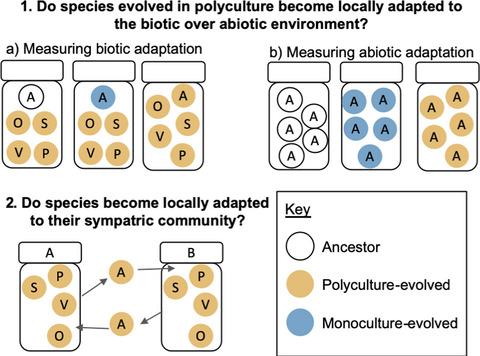当前位置:
X-MOL 学术
›
Ecol. Lett.
›
论文详情
Our official English website, www.x-mol.net, welcomes your
feedback! (Note: you will need to create a separate account there.)
Experimental (co)evolution in a multi-species microbial community results in local maladaptation.
Ecology Letters ( IF 7.6 ) Pub Date : 2020-09-07 , DOI: 10.1111/ele.13599 Meaghan Castledine 1 , Daniel Padfield 1 , Angus Buckling 1
Ecology Letters ( IF 7.6 ) Pub Date : 2020-09-07 , DOI: 10.1111/ele.13599 Meaghan Castledine 1 , Daniel Padfield 1 , Angus Buckling 1
Affiliation

|
Interspecific coevolutionary interactions can result in rapid biotic adaptation, but most studies have focused only on species pairs. Here, we (co)evolved five microbial species in replicate polycultures and monocultures and quantified local adaptation. Specifically, growth rate assays were used to determine adaptations of each species’ populations to (1) the presence of the other four species in general and (2) sympatric vs. allopatric communities. We found that species did not show an increase in net biotic adaptation:ancestral, polyculture‐ and monoculture‐evolved populations did not have significantly different growth rates within communities. However, 4/5 species’ growth rates were significantly lower within the community they evolved in relative to an allopatric community. ‘Local maladaptation’ suggests that species evolved increased competitive interactions to sympatric species’ populations. This increased competition did not affect community stability or productivity. Our results suggest that (co)evolution within communities can increase competitive interactions that are specific to (co)evolved community members.
中文翻译:

在多种微生物群落中进行实验性(共同)进化会导致局部适应不良。
种间共进化相互作用可导致快速的生物适应,但大多数研究仅集中在物种对上。在这里,我们(共同)进化了五种微生物物种,进行了重复混养和单培养并量化了局部适应性。具体而言,使用生长速率测定法确定每种物种的种群对(1)一般而言其他四种物种的存在以及(2)同胞与。异相群落。我们发现物种没有显示出对生物净适应的增加:祖先,多元文化和单一文化演变的种群在社区内的增长率没有显着差异。但是,相对于异源群落而言,它们进化的群落中4/5种的生长速度明显较低。“局部适应不良”表明物种进化出与同胞物种种群的竞争性相互作用。竞争的加剧并未影响社区的稳定或生产力。我们的结果表明,社区内的(共同)进化可以增强特定于(共同)进化的社区成员的竞争性互动。
更新日期:2020-10-19
中文翻译:

在多种微生物群落中进行实验性(共同)进化会导致局部适应不良。
种间共进化相互作用可导致快速的生物适应,但大多数研究仅集中在物种对上。在这里,我们(共同)进化了五种微生物物种,进行了重复混养和单培养并量化了局部适应性。具体而言,使用生长速率测定法确定每种物种的种群对(1)一般而言其他四种物种的存在以及(2)同胞与。异相群落。我们发现物种没有显示出对生物净适应的增加:祖先,多元文化和单一文化演变的种群在社区内的增长率没有显着差异。但是,相对于异源群落而言,它们进化的群落中4/5种的生长速度明显较低。“局部适应不良”表明物种进化出与同胞物种种群的竞争性相互作用。竞争的加剧并未影响社区的稳定或生产力。我们的结果表明,社区内的(共同)进化可以增强特定于(共同)进化的社区成员的竞争性互动。











































 京公网安备 11010802027423号
京公网安备 11010802027423号